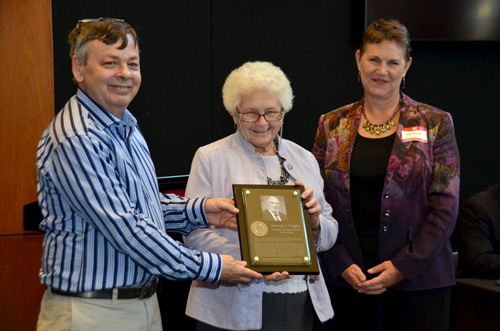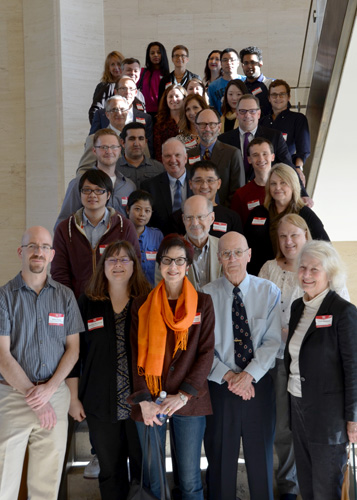Though it takes place just once every five years, the England-Clark Conference is woven into the fabric of the Department of Economics in the College of Business Administration. Celebrating 110 years of doctoral research in economics at the University of Nebraska–Lincoln, the conference brought together CBA economics alumni and current faculty and students for two days of celebration and academic conferences. The conference is named in honor of two pioneers of the economics graduate program: Minnie Throop England (1906), who published an influential body of work addressing business cycle theory and taught at UNL from 1906 to 1921, and Anderson W. Clark (1905), who founded the Child Saving Institute in Omaha, Nebraska.
First held in 2006 to mark a century of doctoral research in economics at UNL, the conference offers a platform for CBA economics alumni to present their latest research and gives current faculty and students a chance to connect with some of the department’s brightest minds while celebrating another milestone year for the department.
 Cushing with Connie and Terri Vaughan accepting honor for the late Emmett J. Vaughan
Cushing with Connie and Terri Vaughan accepting honor for the late Emmett J. Vaughan
“We are the first graduate college west of the Mississippi River. The economics program is one of the first graduate programs from the University of Nebraska. So the University made a commitment to graduate education right from its inception,” said Dr. Scott M. Fuess, Jr, Karl H. Nelson Professor of Economics and department chair. “Since economics was on the forefront of the birth of the graduate college, there’s an awful lot of the University’s DNA that can be found in our graduate program.”
The two-day event included an opening reception at the Sheldon Museum of Art on Thursday, April 21 and an academic conference, reception and banquet on Friday, April 22. Dr. John M. Abowd, Edmund Ezra Day Professor of Economics and Professor of Statistics and Information Science at Cornell University, was the keynote speaker at Friday’s banquet.
“Certainly some of our first, second and third-year students have never been to a conference and never seen this, so it’s getting them involved in what academics do in a fairly friendly environment,” said Dr. Matthew J. Cushing, professor of economics and England-Clark Conference coordinator. “It’s not only practice for our current graduate students to see what our alumni do, and it gives everyone the opportunity to connect or reconnect with our alumni.”
Nine presenters, eight of whom earned their Ph.D. in economics from UNL and another who is a current Ph.D. student in economics, presented during Friday’s academic conference. The presenters were divided into three sessions, with a CBA faculty member in economics serving as a chair for each session. Nine economics graduate students served as discussants during the sessions.
The presenters were:
Session 1: Agriculture and Development
· Dr. Meghan Millea ’98, Mississippi State University, “Minimum Wages in a Segmented Labor Market: Evidence from South Africa”
· Dr. C. Martin Konou ’13, McNeese State University, “Food Price Shocks and their Macroeconomic Policy Implications in Sub-Saharan Africa: DSGE Models”
· Dr. Kanybek Nur-tegin ’06, Florida Atlantic University, “The Effect of Specific, Disaggregated Corruption on Economic Activity”
Session 2: Government
· Dr. Jennifer Bossard ’11, Doane College, “Cost of Government in Nebraska”
· Dr. Hans Czap ’06, University of Michigan-Dearborn, “Farm Bill 2014: An Experimental Investigation of Conservation Compliance”
· Dr. Iksoo Cho ’99, Nebraska Department of Revenue, “Local Sales Tax, Cross-Border Shopping and Distance”
Session 3: Knowledge and Information
· Dr. George Langelett ’00, South Dakota State University, “Valid Estimation of Neurotransmitters in Social Science Research”
· Salfo Bikienga, Ph.D. candidate, University of Nebraska–Lincoln, “Talk the Talk, Walk the Walk, U.S. Governor’s Professed Priorities and Their States Finances”
· Dr. Jamie Wagner ’15, University of Nebraska at Omaha, “Financial Literacy and Education in the First Semester of College: What Do Students Know and Learn?”
At the conference’s banquet on Friday, three alumni were inducted into the Nebraska Economics Ph.D. Hall of Fame.
“If you look at their vitas, what they’ve done is very impressive,” Cushing said of the honorees. “I think it’s inspirational to our current graduate students to hear what our alumni have achieved.”
 Attendees of the conference
Attendees of the conference
The three inductees included: Dr. William H. Melody ’66, Dr. Emmett J. Vaughan ’64 and Dr. Alexander J. Yeats ’70.
Melody founded the Learning Initiatives on Reforms for Network Economics (LIRNE.net) and the World Dialogue on Regulation for Network Economies (WDR), and continues to advise both initiatives. He also served as chief economist for the U.S. Federal Communications Commission and held academic appointments leading new multidisciplinary programs development in seven countries. He maintains an active research agenda and is a consultant and advisor to universities, research centers and government and international organizations such as the United Nations.
Vaughan became a preeminent scholar with an international reputation in insurance, authoring 15 books and monographs and more than 200 scholarly articles. His textbook, “Fundamentals of Risk and Insurance”, now in its ninth edition, is a leader in the field and has been translated into Chinese, German, Italian, Japanese and Korean.
Yeats has authored 14 books and monographs and more than 100 journal articles. He served as the head of the Banking Markets Research Section at the Federal Reserve Board (1971-73), senior economics advisor at the United Nations (1973-88) and principal economist at the World Bank (1988-2003). He continues to consult at the World Bank and UN agencies.
For more information on the economics department, visit cba.unl.edu/economics.
Published: April 26, 2016